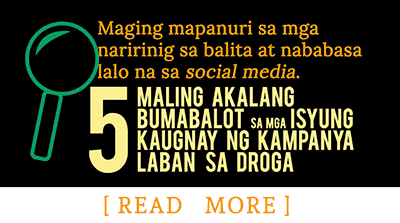Faith groups on Kidapawan clash:
Violence not an option
PMPI laments the unfortunate incident in Kidapawan. What is happening in the drought affected parts of Mindanao is deeply troubling:
- When communities reeling from intense drought still have to rally for days to demand relief after the whole of North Cotabato, has been declared under the state of calamity since January 2016.
- When the government offered the farmers 3 kilograms of rice for every quarter, despite enoughfunds allocated to assist the farmers and the affected populations of the province and for all of Region 12.
- When the government deployed armed forces in full battle gear to disperse the hungry farmers who are claiming their life support provisions, not only with brute force butwith bullets.
- When, after the protest-turned-bloody-mayhem, the arrest and detention of protesters and, without proper investigation of the event,police officers were awarded medal of valor.
- When humanitarian donation and support are being rejected and blocked by the local government amid plea from the people and from the Commission on Human rights to allow neighboring towns to avail of rice aid provided by private individuals and organizations.
As reports from our member organizations and different news agencies came in, it wasenough to make us freeze with helplessness. The images of bloodied farmers in TV and social media shuddered our senses. And even as we try to suspend judgement due to the blaming game, we can’t help but feel for the farmers.
No need for violence
Philippine Misereor Partnership, Inc. national coordinator Yoly Esguerra shared that nothing can justify the action of the police using live bullets to disperse protesting civilians. There were many measures that could have been done to prevent violence to happen. Dialogue and tolerance should always be the modes of action of those in power.
“It was not a secret to us that these areas will be heavily impacted by the drought and that funds were earmarked to help them cope. That we had to wait until it reached this point is unacceptable. Measures to mitigate the impact should have been in place. Relief is due to the affected population of El Nino soonest,” she said.
Presidential Communications Undersecretary Manuel Quezon III in an interview shared that the DSWD has since released P133,426,000 including funds to maintain and complete the required or standard stockpiled 30,000-families food pack and initial assistance for the cash-for-work program. This is to cover the 125,228 families or 626,140 persons affected by El Niño in all of Region 12.
“But where are these funds? Why until now it has yet to reach our farmers?” Fr. Joy Pelino of the Social Action of Marbel said.
He stressed that the matter should have not reached this point if the government only did its job.
Drought gone bloody
Notwithstanding the present turmoil, since 2014 PAGASA has provided ample warning of the start of the El Niño cycle. They sternly informed all that the current cycle was the “strongest in modern history” and will be prolonged well into the middle of 2016.
Interface Development Interventions (IDIS Inc.) Executive Director Ann Fuertes said that if the government prepared well for the people in the affected areas, none of the strings of protests would have happened.
“Given the early warning made by the national weather agency, the government should have foreseen this scenario and placed appropriate measures to address this situation,” Fuertes said. “What the local government did to the protesters was unconscionable. They were only asking for food and yet they were met with such brutish violence.”
Geonathan T. Barro of MASIPAG-Mindanao stressed that responses to drought should not only be limited to giving food packs and relief goods, but also by shifting our country’s agricultural system to become drought-tolerant and be adaptive to climate change.
“In this case, the farmers and IPs were just asking for food. It’s for their survival it’s not for anything else. We are able to eat because of the food they produce, but when it’s their time to need food, the least we can do is to give back to them,” he lamented.
Sr. Susan Bolanio of Oblates of Notre Dame Hesed Foundation, Inc. expressed the need to further conduct investigation on the whole matter.
“Even as I don’t agree that the farmers had to block the national highway, paralyzing the major thoroughfares of the province, the violence that erupted must be thoroughly investigated,” she said.
Rev. Fr. Edu Gariguez, NASSA Caritas Executive Secretary and PMPI co-convenor said that “it is the utmost duty of the state to protect the rights of the most vulnerable especially in situation such as drought and other natural calamity, and not to further inflict pain during an already unbearable situation.”
“We call for an independent investigation on this as much as we condemn the act of violent inflicted on our hungry-stricken farmers. And if real justice should be served, those found guilty should be penalized,” the priest stressed.

